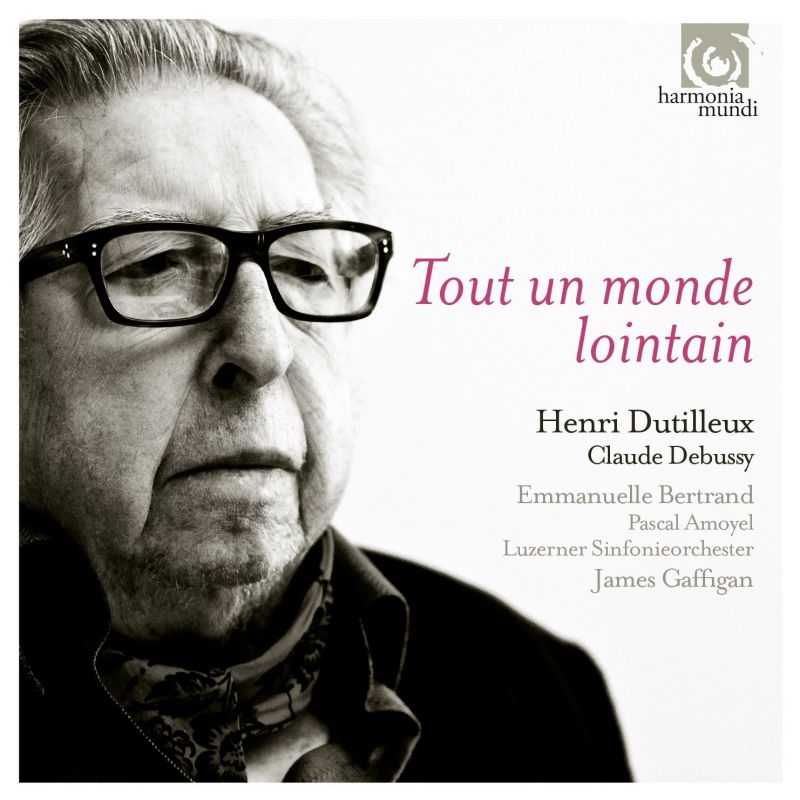DUTILLEUX Cello Concerto "Tout un monde lointain"
View record and artist detailsRecord and Artist Details
Composer or Director: Henri Dutilleux, Claude Debussy
Genre:
Orchestral
Label: Harmonia Mundi
Magazine Review Date: 12/2015
Media Format: CD or Download
Media Runtime: 48
Mastering:
DDD
Catalogue Number: HMC90 2209

Tracks:
| Composition | Artist Credit |
|---|---|
| Concerto for Cello and Orchestra, 'Tout un monde l |
Henri Dutilleux, Composer
Emmanuelle Bertrand, Cello Henri Dutilleux, Composer James Gaffigan, Conductor Lucerne Symphony Orchestra |
| (3) Strophes sur le nom de Sacher |
Henri Dutilleux, Composer
Emmanuelle Bertrand, Cello Henri Dutilleux, Composer James Gaffigan, Conductor Lucerne Symphony Orchestra |
| Sonata for Cello and Piano |
Claude Debussy, Composer
Claude Debussy, Composer Emmanuelle Bertrand, Cello Pascal Amoyel, Piano |
Author: Philip Clark
Emmanuelle Bertrand’s new recording chisels something personal from her awareness of these varied thoughts about a Dutilleux performance tradition. Dutilleux was Bertrand’s mentor, yet her fierce independence shines through. In her hands that same fourth movement, ‘Miroirs’, has a warmer glow than Karttunen (and certainly than the maddeningly monochrome Truls Mørk), and she resists absolutely Queyras’s synthetic sweetness.
Dutilleux’s concerto was his response to the fleeting poetic images of Charles Baudelaire, and Bertrand’s playing remains infused with the idea of his ‘tout un monde lointain’ – a ‘whole distant world’. Mørk feels too often as if he is merely orbiting Myung-Whun Chung’s French Radio Orchestra; but Bertrand achieves a giddying sense of balanced perspective against those delicately spiced flavours served up by James Gaffigan’s Luzerner Sinfonieorchester. The highly misterioso percussive shuffling that opens the piece blends seamlessly into the cello’s low-key entry – the urgency of not much happening; the expressive potential of the unsaid.
And as the movement slips towards a slammed orchestral tutti oddly (consciously?) reminiscent of Messiaen, you realise how far this music has journeyed in such a short space of time. Bertrand’s decision to programme the Dutilleux alongside her rhythmically lithe and subtlety shaded performance of Debussy’s Cello Sonata (1915) is wise; the third movement of the concerto is a salty, fluid seascape clearly indebted to the French master. The disc opens with Dutilleux’s Trois Strophes sur le nom de Sacher (1976) – hardly the most exciting piece ever written, but Bertrand resists the arid dryness I’ve heard elsewhere.
Discover the world's largest classical music catalogue with Presto Music.

Gramophone Digital Club
- Digital Edition
- Digital Archive
- Reviews Database
- Full website access
From £8.75 / month
Subscribe
Gramophone Full Club
- Print Edition
- Digital Edition
- Digital Archive
- Reviews Database
- Full website access
From £11.00 / month
Subscribe
If you are a library, university or other organisation that would be interested in an institutional subscription to Gramophone please click here for further information.




